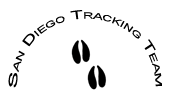Western Transects
The wildlife transects described on this page are located in the western part of San Diego County. Locations include the Los Peñasquitos Canyon Preserve and University City.
Mystery Tree Loop
Leader: Bob MacDonald
Location: Los Peñasquitos Canyon Preserve
Number: 4
Duration: 4 hours
Difficulty: Moderate
Why: To prove that the area was being used by animals as a corridor to traverse the canyon. Data confirming this were used as an argument against housing in the canyon.
What: Mule deer, coyote, raccoon, opossum, wood-rat, bobcat, fox, and skunk track and sign have been observed.
Photos below by Web Admin
Lopez Ridge Wildlife Tunnel
Leader: Art Baer
Location: Los Peñasquitos Canyon Preserve
Number: 18
Duration: 4 hours
Difficulty: Easy
Why: To monitor use of the tunnel by wildlife.
What: A significant increase in use by humans and a corresponding decline in animal tracks have been observed. Nevertheless, tracks and scat from deer, raccoon, coyotes, and bobcat are frequently found. Gray fox, woodrat, and striped skunk tracks are found occasionally.
Photo by Gary Seiser, showing Bobcat (left) and Gray Fox in the wildlife tunnel.
Lopez Ridge Kiosk East
Leader: Art Baer
Location: Los Peñasquitos Canyon Preserve
Number: 19
Duration: 4 hours
Difficulty: Easy
Why: Established in the 1990s to monitor wildlife in the Preserve
What: Decreasing use by animals has been observed while use by humans (walk, run, bike) and dogs has steadily increased. Bobcat and coyote scat are frequently found. Tracks of deer, coyote, racoon and striped skunk have also been found.
Photo by Gary Seiser, showing transect leader Art Baer (left) and Bob MacDonald on transect after stay-at-home orders were lifted.
Peñasquitos Lagoon
Leader: Gary Seiser and Karen
Location: Near I-5 and Carmel Valley Road
Number: 22
Duration: 4 hours
Difficulty: Moderate
Why: This transect was created to monitor the use of the wildlife corridor under the I-5 freeway at this location, and to monitor wildlife use of the area just west of the I-5 south.
What: We normally find tracks and sign of deer - as well as the "real deer" (below left) - raccoon, coyote, bobcat, wood rat, and striped skunk. We also find opossum, gray fox, and various shore birds, and in 2018, mountain lion tracks (below right).
Photos by Gary Seiser
Rose Canyon
Leader: Art Baer
Location: Rose Canyon, University City
Number: 51
Duration: 4 hours
Difficulty: Easy
Why: Rose canyon is in a quintessential coastal San Diego location where urbanization, habitat fragmentation, and heavy human use are the key conservation challenges. The transect lies in the Rose Canyon open space park a couple of miles from the ocean. Although much of the area has been disturbed, Rose Canyon is one of the few remaining areas of coastal sage scrub ecotype. For this reason, a proposal to build yet another bridge across the open space along Regents road led to the formation of the Friends of Rose Canyon (FORC). It also convinced SDTT to establish a transect to monitor the area for wildlife presence. In 2016, the San Diego City Council withdrew plans for the Regents road bridge. More recently, the city planned to route the trolley line through the canyon and FORC was able to work with the city council and realign majority of the trolley track away from the open space park.
What: The transect typically has a mix of small mammals and mesopredators. Coyotes and bobcats are quite common and during rare instances, deer have been noted. Rose canyon is an excellent birding spot.
Sycamore Crossing
Leader: Erik Tracy
Location: Los Peñasquitos Canyon Preserve
Number: 64
Duration: 4 hours
Difficulty: Moderate
Why: This transect covers parts of two of the original SDTT transects and is the only remaining transect that covers the center section of Los Peñasquitos Canyon Preserve.
What: The trail is heavily used by mountain bikers and what we find typically depends on their activity level.
Photo by Vince Butsumyo, Cicada,
Los Peñasquitos Canyon West End
Leader: Heidi Gutknecht
Location: Los Peñasquitos Canyon Preserve
Number: 65
Duration: 4 hours
Difficulty: Easy
Why: To monitor the declining presence of and use by wildlife in the preserve.
What: Signs of deer, coyote, rabbit, rodent, woodrat, bobcat, raccoon, skunk and opossum have been observed along this transect.
Photo by Vince Butsumyo







